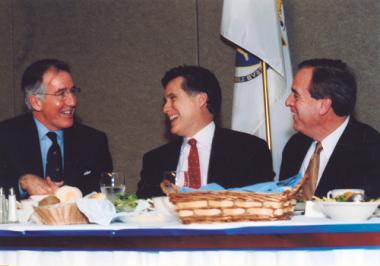Did you catch the squalid YouTube dust-up between Mitt Romney and Glen Johnson, the Associated Press reporter? These hip and vivid little video snippets that now pepper our lives are remarkable for their novelistic detail and nuance, and go to show how "straight" print reporting can obscure a multitude of pertinent, not-socomfortable, realities.
First of all, as the psychedelic wise men used to say, it's all about set and setting, and the dreary fluorescence-bathed wasteland of the Staples store in South Carolina where the campaign event and subsequent dispute took place could start anyone's teeth grinding. Mitt and the reporter have that adrenalized, lit-up, worn-down look of people who have been grinding away on too much coffee and too little sleep, are seeing no light at the end of a long tunnel, and are doing their testy best to keep pushing through the rote motions of their straitjacket roles.
Mitt is holding forth, in his smarmy self-congratulatory way (all the candidates are self-congratulatory, of course; our mission in a presidential election is to anoint the king or, should we be so enlightened, queen of self-congratulation). Mitt is pronouncing himself, quite preposterously, as being free of evil Washington influence: "I don't have lobbyists running my campaign. I don't have lobbyists tied to my…" At which point reporter Johnson butts in, in what seems a genuinely helpless fit of pique: "That's not true!"
Here the two remind me of nothing so much as the old married couple, headed for divorce, with Glen in the role of dutiful spouse who's been sitting there for far too long, captive to the old fart's bogus war tales, and has finally decided she's had it, she's had enough. For an AP reporter, such behavior is surprising, and, yes, qualifies as a real breach of conduct (I worked for AP for a number of years, and it's like nothing so much as the Army—merciless deadlines and the need to maintain an appearance of objectivity demanded adherence to a strict managerial hierarchy, a rigid sense of one's place).
And, while I think the flock of sheep that constitute the majority of the national press corps are far too meek in the quizzing of the candidates and the issues, Mr. Johnson's impetuous moment demonstrates why he was wrong to do it. Not wrong in any political sense, not because, as the right-wing blogs are suggesting, he gave in to churlishness and an obvious liberal bias, but in a practical sense: his timing was terrible, couldn't have been worse. To all appearances Robinson cut Romney off at just the moment when he was firmly and irretrievably about to insert his foot in his mouth, not just being truthy—"I don't have lobbyists running my campaign"—but downright false: "I don't have lobbyists tied to…"
It should be fairly obvious that he was about to conclude with "my campaign." But he didn't say it, and so couldn't be held to it. What then ensued was a dispiriting and evasive semantic back-and-forth about what it meant to "run" a campaign, and who it was that was doing the running. Romney counter-jabbed with bullying condescension— smilingly bullying, of course—and rhetorical repetitions: "Did you hear what I said? Did you hear what I said, Glen?", and "Listen to my words. Listen to my words," as if he were talking to a recalcitrant child.
This was followed by another and even sharper browbeating from campaign manager Eric Fehrnstrom, who insisted, in lilting parental tones, that the callow youth "act professionally, don't get argumentative with the candidate." Fehrnstrom insisted, with strained forbearance, four times: "Save your opinions. Save your opinions. Save your opinions. Save your opinions."
*
What the whole episode should make clear is that, while Johnson suffered a real lapse in his professional behavior—for some reason, and a little comically, the guy just couldn't swallow any more—this same "professionalism" is something candidates customarily use as a kind of cover and are very happy to hide behind; and that the terms by which one defines what is "opinion" are fluid and up for grabs by whoever can stomp the loudest.
The Romney people knew very quickly that they had inadvertently unlocked a window, that the smell of something unsavory was seeping out, and so they rushed to slam it down on the fingers of the guy who was working to pry it open as quickly and decisively as they could. They assume in such situations that whoever most aggressively defines the moment—counting as they can on the generally lazy "professional" efforts of the press, and the drifting and distracted attention of the public—will walk away, on the shady runways of our modern contingencies and corruption, the winner.
But if an opinion is provable, then I guess you have to call it fact.
If Glen Johnson is a good reporter—and the people who reach that level in the AP, after years of hard service, almost always are—what he's regretting is not that he called Romney out on his blatant slipperiness. He was well within his rights; we the people need reporters to be dogged in highlighting the self-serving hypnotizing deceptions fed to us by the powerful, and need it more than we get it.
And he was standing on solid reportorial ground in his knowledge of the facts: for months the reporter had witnessed the comings and goings of lobbyists in the campaign. Mitt has four or more bonafide lobbyists who advise him on a regular basis, and surely one can say, without walking out too far on the semantic plank, that they are responsible, at least in part, for "running" his campaign.
What Johnson must most regret—aside, I suppose, from a fear of losing his job or a fall from his lofty position; the AP tends to be harsh on such transgressions—was that he didn't wait patiently, by the book, for just a moment more for the three words that would have caught the dissembling candidate between his own smiling teeth.



